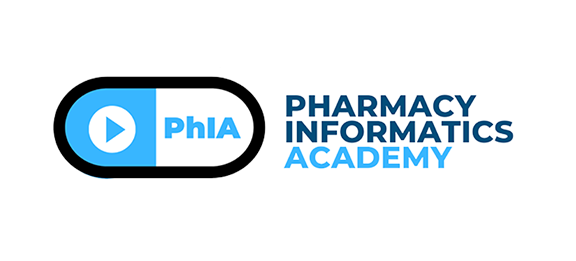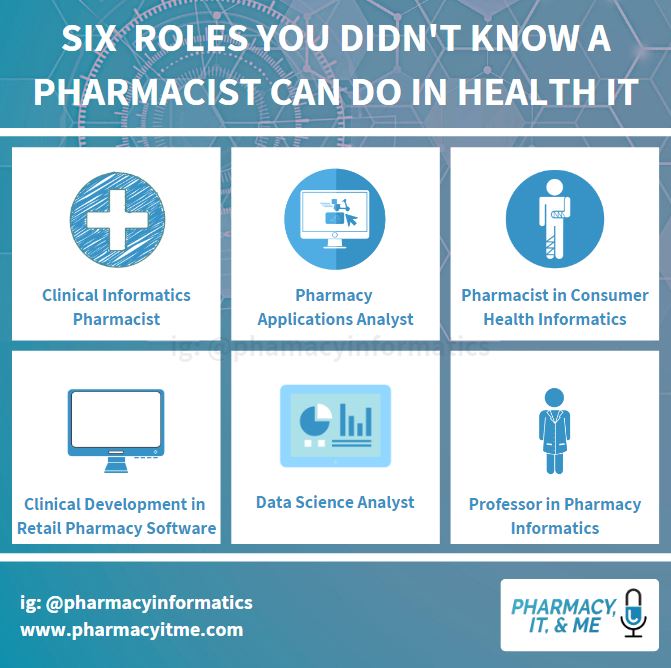Six Roles You Didn’t Know a Pharmacist Can Do in Health IT
Infographic about pharmacy informatics roles originally posted on Pharmacy, IT, & Me‘s social media accounts.
When someone hears of the term “pharmacy informatics”, it’s often assumed that it’s one specific role that pharmacists have involving technology. However, this is not the case, and as with any specialty, there are a lot of subspecialty roles within the pharmacy informatics banner. These infographics are part of a series I originally posted on my Pharmacy, IT, & Me podcast’s social media pages, but I’m here to expand on these roles and responsibilities for the Pharmacy Informatics Academy. There will be more posts like these in the future, but here are the first six.
Clinical Informatics Pharmacist
Depending on the needs on the institution, this is one of the pharmacy informatics roles that can vary a lot in terms of specificity and job duties. Clinical informatics pharmacists typically spend a lot of time managing multiple implementations of projects and maintaining existing pharmacy informatics, hardware, and software systems. Informatics pharmacists may or may not have a team of analysts that they work with.
Here is an interview that Dr. Richard Waithe conducted with me about my role as a Clinical Informatics Pharmacist.
Pharmacy Applications Analyst
Pharmacists can also play a role as an applications analyst, though these roles don’t technically require the analyst to be a pharmacist. Depending on the amount of detail needed, pharmacy applications analysts can also be pharmacy technicians. The analyst role involves assessing systems and doing the day-to-day design and coding of the backend. Analysts have many deliverables that are essential to pharmacy workflow initiatives.
Interview with Pharmacy Applications Analyst Dr. Alex Vu
Pharmacist in Consumer Health Informatics
Consumer Health Informatics is a catch-all term for all the technology that exists in healthcare that helps individuals improve their personal health outside of an institutional setting. These can include Bluetooth-enabled glucose monitors, digital therapeutics like digitized inhalers, and devices that track and improve medication adherence. Pharmacists can work in these roles on the medication-focused side, such as working to provide mobile apps that can visually show patients how to take their medications or creating robotic assistants that engage in patient mental health.
Interview with President of VUCA Health Dr. Richard Waithe
Clinical Development in Retail Pharmacy Software
Community pharmacies and retail pharmacies need software that is developed in a way to optimize their daily operations. Behind the software development team are also pharmacists that ensure the clinical data and the software workflows make sense in the setting of a community pharmacy.
Interview with Dr. Mimi Baker who had experience with a community pharmacy application company
Data Science Analyst
Healthcare data continues to exponentially increase and get logged. The more data we have, the more we need to analyze and make sense out of them, applying predictive modeling to help with artificial intelligence and clinical decision support. Pharmacists can take on the role of data science analysts and work with these data sets to figure out the best way they can be used for future clinical applications.
Interview with Data Scientist/Pharmacist Dr. Dalton Fabian
Professor in Pharmacy Informatics
As with any profession, one of the most important aspects is teaching the next generation in the field. Pharmacy informatics is still a relatively new field, so there’s a major need for pharmacy informatics training. This is actually part of the reason why the Pharmacy Informatics Academy was started. Pharmacists who have had the experience in informatics can contribute back to the profession by teaching the subject for the next generation.
Interview with professor of pharmacy practice and informatics at KGI School of Pharmacy, Dr. Armen Simonian


Journey from Inpatient Pharmacist to EHR Trainer
June 2, 2020 @ 8:13 pm
[…] a student in pharmacy school, I was unaware of the unique career paths pharmacists can work in. I only thought that it was either the hospital or community pharmacy route. I was […]